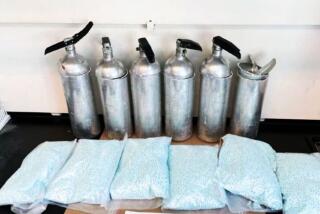14 indicted in deadly 2012 meningitis outbreak
Fourteen people connected to a Massachusetts compounding pharmacy have been arrested on charges stemming from the 2012 meningitis outbreak that killed 64 people who received tainted drugs, officials said Wednesday.
In the high-profile criminal case involving contaminated medicine, Barry Cadden, a co-founder of the New England Compounding Center of Framingham, Mass., and Glenn Adam Chin, a pharmacist who was in charge of the sterile room, face the most serious charges, according to the 131-count indictment.
All defendants were arrested in raids at their homes, according to the U.S. attorney’s office in Boston, and appeared in federal court in Boston, where most were expected to be released.
Chin, 46, was first arrested at Boston’s Logan International Airport in September attempting to board a plane to Hong Kong, according to the U.S. attorney’s office. He was originally charged with one count of mail fraud and has been detained in his home since then, according to his lawyer, Stephen J. Weymouth.
“He feels hugely remorseful for everything that’s happened, for the injuries and the deaths, but he never intended to cause harm to anybody,” Weymouth said. He called the charges an “overreach.”
Hearings have been scheduled for this week on whether to hold Chin and Cadden, allow them to post bail or be confined to home detention while awaiting trial, Weymouth said.
Both men are accused in the federal racketeering indictment of causing the deaths of patients in several states by “acting in wanton and willful disregard of the likelihood” that their actions would cause death or great bodily harm. The indictment says they were responsible for the second-degree murders of 25 patients in states including Florida, Indiana, Maryland, Michigan, North Carolina, Tennessee and Virginia.
If they are convicted, they could face up to life in prison.
The defendants also face a variety of other charges, including racketeering, introducing adulterated drugs into national commerce, contempt and mail fraud.
U.S. Atty. Carmen Ortiz told reporters that the facility was filthy and failed to comply with basic health standards, and that employees knew it. For example, she said, they falsified logs on when labs were cleaned. “Production and profit were prioritized over safety,” she said.
Prosecutors said in the indictment that the pharmacy and Medical Sales Management Inc. — a company that shared ownership with the New England Compounding Center and provided it with sales and administrative services — constituted a criminal enterprise whose purpose was to “obtain money and property including through the means of materially false and fraudulent pretenses, representations, and promises.”
In fall 2012, 751 people were sickened and 64 died from a fungal meningitis outbreak. They had received injections of preservative-free methylprednisolone acetate produced at the New England Compounding Center. The federal Centers for Disease Control and Prevention said that of those 751 patients treated with the drug, 64 died.
The deaths set off fears across the nation. Drugs were recalled and doctors were forced to find alternative sources for steroids used in the treatment of back pain and other ailments.
“Every patient receiving medical treatment deserves the peace of mind and knowledge that the medicine they are receiving is safe,” acting Associate Atty. Gen. Stuart F. Delery said at a news conference in Boston. “When people and companies violate that trust and break the law, through conduct as alleged in the indictment that we are announcing today, the consequences to patients and their families can be catastrophic.”
“Two years after the fungal meningitis outbreak, our hearts continue to go out to the victims of this tragedy and to their families,” FDA Commissioner Margaret A. Hamburg said. “Our work on behalf of all patients who want and deserve medicines that do not subject them to undue risk is far from done.”
After the deaths, investigators pored through the records of the compounding pharmacy, which went into bankruptcy protection and gave up its pharmacy license. Congressional hearings were held, but top officials, facing civil actions, refused to testify on constitutional grounds.
The pharmacy was founded in 1998 by Cadden and his brother-in-law, Gregory A. Conigliaro. Cadden, who is married to Conigliaro’s sister, Lisa, earned a pharmacy degree from the University of Rhode Island.
Conigliaro is charged with acting with Cadden to deliberately mislead federal drug regulators.
Cadden and Conigliaro also are accused of conspiring to direct employees to falsify records. In order to operate as a compounding pharmacy, rather than a manufacturer, the company needed names of specific patients, and company officials allegedly instructed workers to create fake patient names.
michael.muskal@latimes.com
More to Read
Start your day right
Sign up for Essential California for news, features and recommendations from the L.A. Times and beyond in your inbox six days a week.
You may occasionally receive promotional content from the Los Angeles Times.







